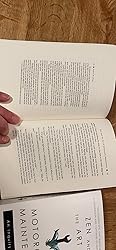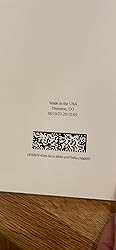
Download the free Kindle app and start reading Kindle books instantly on your smartphone, tablet, or computer - no Kindle device required.
Read instantly on your browser with Kindle for Web.
Using your mobile phone camera - scan the code below and download the Kindle app.

OK
Zen and the Art of Motorcycle Maintenance: An Inquiry into Values Mass Market Paperback – April 25, 2006
THE CLASSIC BOOK THAT HAS INSPIRED MILLIONS
A penetrating examination of how we live and how to live better
Few books transform a generation and then establish themselves as touchstones for the generations that follow. Zen and the Art of Motorcycle Maintenance is one such book. This modern epic of a man’s search for meaning became an instant bestseller on publication in 1974, acclaimed as one of the most exciting books in the history of American letters. It continues to inspire millions.
A narration of a summer motorcycle trip undertaken by a father and his son, Zen and the Art of Motorcycle Maintenance becomes a personal and philosophical odyssey into fundamental questions on how to live. The narrator's relationship with his son leads to a powerful self-reckoning; the craft of motorcycle maintenance leads to an austerely beautiful process for reconciling science, religion, and humanism. Resonant with the confusions of existence, this classic is a touching and transcendent book of life.
This new edition contains an interview with Pirsig and letters and documents detailing how this extraordinary book came to be.
- Print length540 pages
- LanguageEnglish
- PublisherMariner Books
- Publication dateApril 25, 2006
- Dimensions4.19 x 1.12 x 6.75 inches
- ISBN-100060589469
- ISBN-13978-0060589462
Books with Buzz
Discover the latest buzz-worthy books, from mysteries and romance to humor and nonfiction. Explore more
Similar items that may ship from close to you
 When you want to hurry something, that means you no longer care about it and want to get on to other things.Highlighted by 12,666 Kindle readers
When you want to hurry something, that means you no longer care about it and want to get on to other things.Highlighted by 12,666 Kindle readers The truth knocks on the door and you say, “Go away, I’m looking for the truth,” and so it goes away. Puzzling.Highlighted by 8,776 Kindle readers
The truth knocks on the door and you say, “Go away, I’m looking for the truth,” and so it goes away. Puzzling.Highlighted by 8,776 Kindle readers Caring about what you are doing is considered either unimportant or taken for granted.Highlighted by 8,460 Kindle readers
Caring about what you are doing is considered either unimportant or taken for granted.Highlighted by 8,460 Kindle readers
Editorial Reviews
Review
“An unforgettable trip.” — Time
“Zen and the Art of Motorcycle Maintenance sold millions of copies and made Pirsig a reluctant hero to generations of intellectual wanderers…Zen was an instant classic — a work of literature that captured the spirit of its time and retained its appeal long after the hippie movement had faded.” — Washington Post
“A touchstone. … Pirsig’s plunge into the grand philosophical questions of Western culture remained near the top of the bestseller lists for a decade and helped define the post-hippie 1970s landscape.” — New York Times
“The truly great road trip novel. … Many former angsty teens will surely fondly recall their own dog-eared, heavily underlined copies of Pirsig’s book, and the initial joy that accompanied reading something that felt so specifically personal and yet so urgently universal. … Zen’s ongoing reprints, its devoted fan base, and the countless road trips and pseudo-spiritual journeys it’s inspired are indicative of the book’s ongoing appeal.” — GQ
“Inspired college classes, academic conferences and a legion of 'Pirsig pilgrims' who retrace the anguished, cross-country motorcycle trip at the heart of his novel.” — Los Angeles Times
“Profoundly important...full of insights into our most perplexing contemporary dilemmas.” — New York Times
“The book is inspired, original. . . . The analogies with Moby-Dick are patent.” — The New Yorker
“It is filled with beauty. . .a finely made whole that seems to emanate from a very special grace.” — Baltimore Sun
“A miracle . . . sparkles like an electric dream.” — The Village Voice
From the Back Cover
One of the most important and influential books written in the past half-century, Robert M. Pirsig's Zen and the Art of Motorcycle Maintenance is a powerful, moving, and penetrating examination of how we live . . . and a breathtaking meditation on how to live better. Here is the book that transformed a generation: an unforgettable narration of a summer motorcycle trip across America's Northwest, undertaken by a father and his young son. A story of love and fear -- of growth, discovery, and acceptance -- that becomes a profound personal and philosophical odyssey into life's fundamental questions, this uniquely exhilarating modern classic is both touching and transcendent, resonant with the myriad confusions of existence . . . and the small, essential triumphs that propel us forward.
About the Author
Robert M. Pirsig (1928–2017) is the author of Zen and the Art of Motorcycle Maintenance, which has sold more than five-million copies since its publication in 1974, and Lila, a finalist for the 1992 Pulitzer Prize for Fiction. He graduated from the University of Minnesota (B.A., 1950; M.A., 1958) and attended Benares Hindu University in India, where he studied Eastern philosophy, and the University of Chicago, where he pursued a PhD in philosophy. Pirsig’s motorcycle resides in the Smithsonian Institution.
Product details
- Publisher : Mariner Books; First Edition (April 25, 2006)
- Language : English
- Mass Market Paperback : 540 pages
- ISBN-10 : 0060589469
- ISBN-13 : 978-0060589462
- Item Weight : 9.4 ounces
- Dimensions : 4.19 x 1.12 x 6.75 inches
- Best Sellers Rank: #88,809 in Books (See Top 100 in Books)
- #68 in Zen Philosophy (Books)
- #248 in Medical General Psychology
- #854 in Contemporary Literature & Fiction
- Customer Reviews:
About the author

Robert M. Pirsig was born in 1928 in Minneapolis, Minnesota. He holds degrees in chemistry, philosophy, and journalism and also studied Oriental philosophy at Benares Hindu University in India. He is the author of Zen and the Art of Motorcycle Maintenance and Lila.
Photo by Ian Glendinning, en:User:IanGlendinning [GFDL (http://www.gnu.org/copyleft/fdl.html), CC-BY-SA-3.0 (http://creativecommons.org/licenses/by-sa/3.0/), CC BY 2.5 (http://creativecommons.org/licenses/by/2.5), CC BY 2.0 (http://creativecommons.org/licenses/by/2.0) or CC BY 1.0 (http://creativecommons.org/licenses/by/1.0)], via Wikimedia Commons.
Customer reviews
Customer Reviews, including Product Star Ratings help customers to learn more about the product and decide whether it is the right product for them.
To calculate the overall star rating and percentage breakdown by star, we don’t use a simple average. Instead, our system considers things like how recent a review is and if the reviewer bought the item on Amazon. It also analyzed reviews to verify trustworthiness.
Learn more how customers reviews work on AmazonReviews with images
-
Top reviews
Top reviews from the United States
There was a problem filtering reviews right now. Please try again later.
One of the complaints I see here is that there isn't much of the title's Zen nor much motorcycle maintenance, either -- and I note that the author says something about this in his introduction, so it must be true, right? -- yet I believe there is plenty of both. If the reader is expecting an introduction to Zen or a How To manual on motorcycle maintenance, those will not be found. It's not even the author sharing his enjoyment of either of the two fields with his audience. But the themes that run throughout the book explore many of the same ideas the Buddha did, and several concepts important to motorcycle maintenance that will not be found in manuals are discussed throughout the work. But the title really represents the duality that Pirsig puts under his microscope: Zen represents the hippie "go with the flow" attitude that is contrasted to the "slice and dice" schemes of technology, via motorcycle maintenance. And in the end, the title doesn't say just motorcycle maintenance; it's the "Art " that's critical, because one thing the book is aiming for is to show us that the science of technology is an art -- or at least should be an art -- and that the two ways of looking at life don't need to be in opposition, but can be quite naturally blended, to the benefit of all concerned.
It might seem like the novel is caught in its time, with language about those who see things as "groovy" vs. "the squares" but the dichotomy between the two has been under discussion in various forms for centuries: romanticism vs. empiricism, passion vs. logic, science vs. religion. The same split is found today underlying two sides of the debate over climate change. If the book is not approached as being literally about Zen and motorcycle maintenance, but as using these as stand-ins for concepts that can be much larger -- or even much smaller -- there is a lot to be gained here.
Another complaint is that the protagonist is not sympathetic, but that's because this isn't a novel written from the romantic side, nor, really, the empirical side -- it's not even a novel, though it reads a lot like one -- it is a true-enough tale of relationships between two related men, and a father and a son, and a road trip that carries with it time for plenty of slow discussion of philosophy. The book takes its time putting the pieces together, and the author isn't trying to win our love -- if you can approach the book on its own terms rather than with a whole load of expectations about what it should do and how it should do it, you may get something out of it -- but to truly enjoy it, you've got to go with the flow, you know?
I know I get a lot out of it every time I read it. I love road stories, and this one is paced just like a real long-distance trip, with long stretches of time to think things through interspersed with short breaks for taking care of the business of life. That what's going on in the environment, relationships, and other encounters reflects what's being thought through in the long stretches is a small bonus. The writing is clean and evocative, enjoyable. For the most part, the carefully constructed introduction to all the elements needed to understand the philosophy is gentle enough to be clear and not overly taxing, at least until the deepest parts, which can be hard to follow (and for good reason). The elements of psychological mystery captivate me each time.
I first read ZAMM the year it was released, in the mid-70s, and have read it at least every five years since then, and each time I thoroughly enjoy it. The first time through, I could not follow the philosophy all the way down into the descent into madness it brought on. Five years later -- with time for the ideas to be examined through my own life -- I got it, even agreed with it. This time, this reading, is the first time I ended up doubting the validity of the greatest philosophical insights the story offers. Ironically, it's my deepening understanding of Buddhism that changed my mind.
There really is a lot of Buddhism in this book, and not specifically Zen, either, but the deepest themes common to all forms of Buddhism. The questions about the wisdom of dividing the world up into a duality of the physical vs. the mental, of seeing ourselves as somehow separate from everything else, these were explored by the Buddha, too, though the framework he used to discuss these ideas was -- obviously -- nothing to do with motorcycles. In Dependent Arising he, too, considers how it comes to be that we split the world in two. "Name and form" he calls this split, and later thinkers have described what he was talking about as the same subject-object division that Pirsig is mulling over in ZAMM. The Buddha, though, says that it is "desire for existence" -- not quality -- that, to borrow Pirsig's phrase, "is the generator of everything we know". I tend to agree with the Buddha because I can see in our lives, and through our sciences, what that desire for existence is and why it drives us to divide the world up the way we do, and exactly how it leads us into trouble. I can't say the same for Pirsig's metaphysics, but that doesn't stop me from deep enjoyment of the book. I hope to have another half-dozen five-yearly reads, if I'm lucky, and -- who knows -- maybe I will come around again to see it the way he does.
Books are different beasts when you read them a second time. The first time I loved the description of the scientific method and it's application to debugging computer programs (in addition to the problems you find when you need to repair a motorcycle):
When you’ve hit a really tough one, tried everything, racked your brain and nothing works, and you know that this time Nature has really decided to be difficult, you say, “Okay, Nature, that’s the end of the nice guy,” and you crank up the formal scientific method. For this you keep a lab notebook. Everything gets written down, formally, so that you know at all times where you are, where you’ve been, where you’re going and where you want to get. In scientific work and electronics technology this is necessary because otherwise the problems get so complex you get lost in them and confused and forget what you know and what you don’t know and have to give up. (Loc 1603)
This time around, I found another part of the story, the story about a father and son, re-united after a horrifying personal disaster, and the realization that it as his son that brought him out of the psychiatric ward:
We’re related to each other in ways we never fully understand, maybe hardly understand at all. He was always the real reason for coming out of the hospital. To have let him grow up alone would have been really wrong. In the dream too he was the one who was always trying to open the door. I haven’t been carrying him at all. He’s been carrying me! (Loc 6249)
What's great about the book is that all this is interspersed with a motorcycle trip from Minnesota to California. It's full of little tips about cycle touring that indicate that Pirsig did do quite a bit of motorcycle touring, though he does spend way too much time on a freeway in California instead of riding down the coast. (And much like most tourists, he makes the mistake of visiting the California coast during the summer, when it's mostly fogged in) There are also little interesting observations about people on the road:
While we wait for chocolate malteds I notice a high-schooler sitting at the counter exchanging looks with the girl next to him. She’s gorgeous, and I’m not the only other one who notices it. The girl behind the counter waiting on them is also watching with an anger she thinks no one else sees. Some kind of triangle. We keep passing unseen through little moments of other people’s lives. (Loc 4385)
Ultimately, the book's a philosophical novel, with lots of explanation of the authors' ideas about the nature of Quality, the split between the arts and the sciences, and his attempts to unify the two by keeping Quality undefined as, "You know it when you see it." For a rhetoric class at the places Pirsig has taught, I think this approach might work. For those of us working in technology, however, I'm not sure that non-definition is useful. There's a certain sense that those who care passionately enough about their work enough to have strong opinions and defend them are better engineers than those for whom engineering is "just work." On the other hand, you could argue that in many ways, the constant arguments over the quality of say, the choice of programming language is well over-blown, and people would mostly be better of getting work done than engaging in the low-Quality flame wars that you find on the internet.
Regardless of how you feel, however, the novel is thought-provoking, interesting, and never dull, despite being mostly about ideas, rather than being about characters or plot. It's a great book and well worth reading and re-reading. Highly recommended.
Top reviews from other countries
El libro esta estructurado en un formato de novela, la cual es bastante interesante.
Si te gusta la filosofia, o si te gusta el Zen lo recomendaria ampliamente.





























